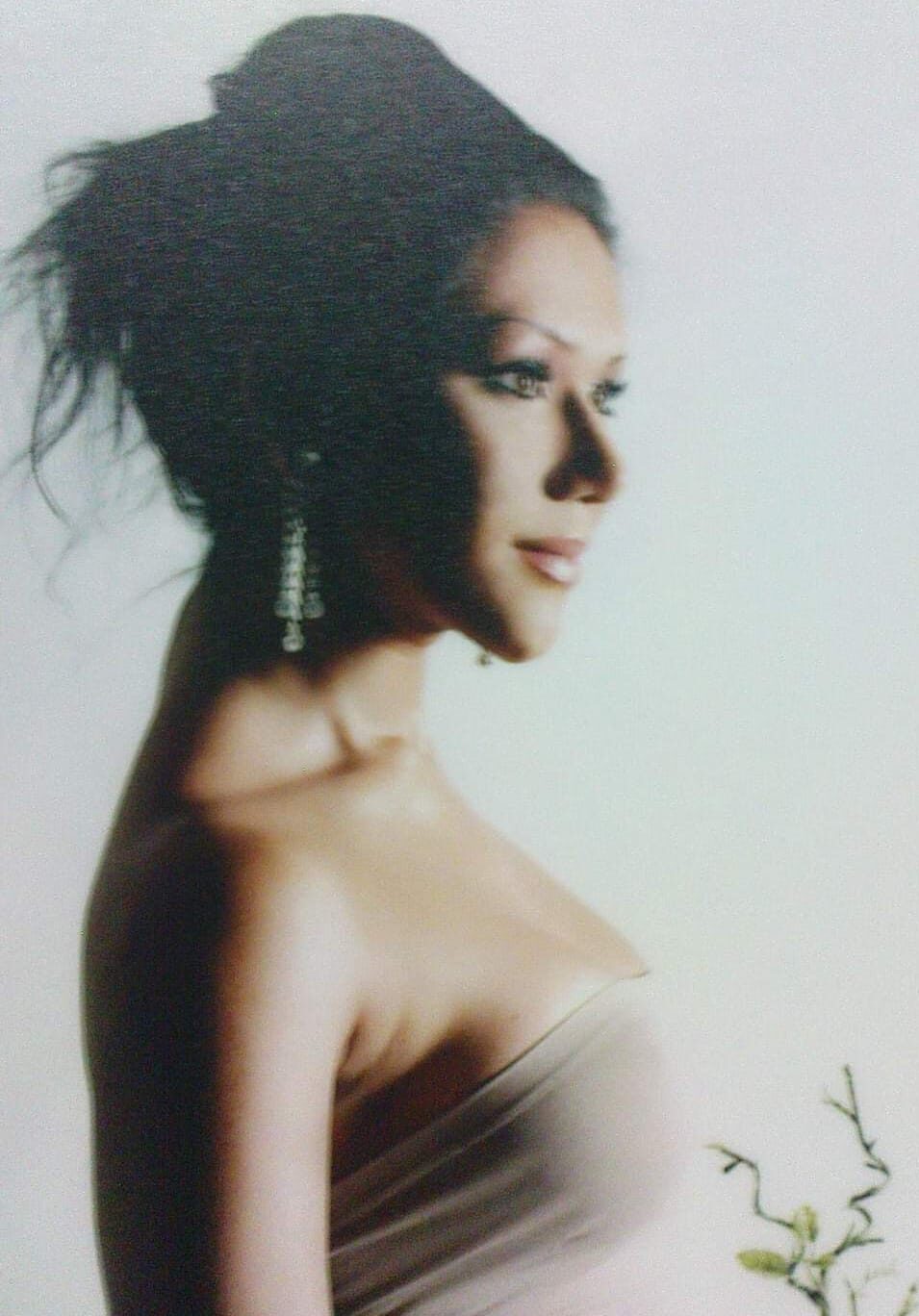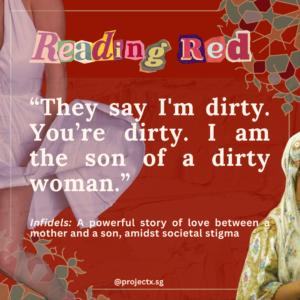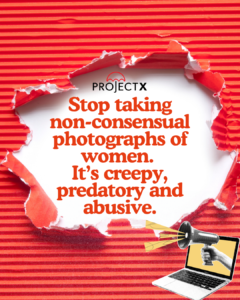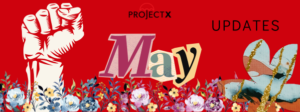Trigger Warning: Substance use
Too often, we only give flowers to people once their walk on Earth comes to an end. Since 1999, the world observes Transgender Day of Remembrance every 20th of November. On this day, we honour the memory of those who lost their lives due to transphobic violence. While violence within this specific context manifests itself through physical harm, it is also important to acknowledge pre-existing systemic violence that prevents transgender people from accessing basic needs and affirming care to live a quality life. Being transgender should not have to mean a lesser life, or worse, a death sentence. If we look elsewhere and are willing to listen, we will also find within the transgender community, an abundance of self-determination as well as stories of life-affirming kinships.
In Singapore, a significant number of sex workers are transgender women. Transgender women here face a myriad of challenges be it pushback from family members to discrimination within the job market. With the lack of opportunities, many transgender women enter the sex trade.
For our TDOR feature, I spoke to Alisha, a former sex worker. Alisha first realised that she was transgender at a tender age of 14. At that age, she found friends who taught her makeup and how to dress. She eventually moved out from her parents’ home and got suspended from school as her urge to express herself as a woman became stronger. After she stopped going to school, she turned to sex work to support herself. Senior transgender women introduced her to the streets of Changi Village, before she worked her way through Geylang then Orchard Towers.
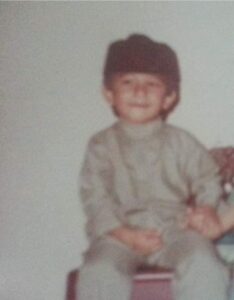
Young Alisha
N: Let’s start off with a little introduction. Can you tell me a little bit about yourself?
A: My name is Alisha. I am 36 years old. Currently, I’m single and living with my relatives. I’ve been working as a full time sales assistant.
N: I understand that you started working the streets quite young?
A: Yes, when I was about to turn 16 years old. It’s been more than 20 years since. From there, I learnt by meeting groups of transgender people. I knew how to deal with people and gave them their due respect. I was lucky to have someone guide me along even though not all were truthful. I asked around. I was the kind of person to ask if I was not sure of anything. I was young and also excited. I started to work the streets in Changi in 1999. I earned a living through picking up customers. You stood on the street where they drove. They would pick you up and you would “open price”, for a blowjob or for sex. The girls there taught me there were some places, some spots for us to do the “projects”.
N: Tell me more about your journey of transitioning.
A: Realising that I was transgender at a young age meant that I did not get to explore much. During the 90s, you didn’t have Pink Dot or these [supportive] organisations. We had to identify our inner self, who we really are and learnt to be comfortable enough to walk everyday in public. I was introduced to life through the streets. I was not a party freak but I considered it all as part of my learning. There I was introduced to intoxicating substances. I found that it gave me confidence and boosted my self-esteem. I could dress up well. I had more energy and strength. Strength to build up my inner self. Confidence to interact with people.
I just needed to do it, it was part of how I was earning. I needed to earn. I turned to substance abuse so I wouldn’t feel awkward, or insecure in the public where people will look at me. When you work in the streets, you’re meeting different kinds of people. Maybe they were dangerous and could cause danger to you. I turned to substance abuse. I was insecure about my gender when I was too fat. I took drugs again and again. The dosage got heavier until I found that I was no longer myself character wise. I looked at myself and thought I was confident. But I was not being my real self. I was running away from reality. That was how I ended up in prison for 12 years.
For that period of 12 years, life did not feel realistic to me. I was in the cloud of darkness, in and out. 2 years ago in June, I told myself that it’s time for me to stop all this. I started to change my life lah, bit by bit, back to reality, back to society. I sought help through counsellors. I sought advice and met a lot of people who were involved in organisations. I did not want to interact with them prior. I found that it worked for me. I’ve learned a lot of things by identifying myself, who I am and just how I should lead a life, a proper life, you know? What I’m expecting of myself is never to stop, never giving up when faced with obstacles, and keep on beautifying myself. That’s what I want to do.
“We had to identify our inner self, who we really are and learnt to be comfortable enough to walk everyday in public.”
N: In the past a lot of trans women turned to sex work because society wasn’t open enough to hire them. How do you think sex work has impacted you and who you are as a person?
It has impacted me a lot. I started when I was young, you know. After 12 years, I thought to myself I wanted to change because I no longer had the confidence to work, to go back to society. I wanted to do it the right way, by not getting myself involved in something that is against the law in Singapore. But I found out that, no I couldn’t. Being who I am, I don’t blame my surroundings, I don’t blame people. It’s just me. It’s who we are, it’s how we pick ourselves up after something went wrong in our lives and I always tell myself I chose this path, it’s me.
There were a lot of ways and help that I could find but at that point of time, maybe, the organisations, the help, the directions were not quite open. Maybe I was too young. I just jumped into it straightaway. When you are young you get more excited. But after a long while, I feel like I just love being who I really am. I love to be involved in transgender associations, reading about transgender people and their lives, how they went through hardships. You know, this is what I love. Whenever I meet newcomers when they come to Fitrah, the organisation I joined, we have these meetings about being Muslim where we share about the do’s and don’ts, the hukum and rules, the laws of shariah. You know how you went through hardships in life when you were younger? You don’t want the newbies to go through the same thing as how we went through.
N: That’s very kind and generous of you to look out for the people who are coming up. Would you say that sex work was difficult for you?
A: During that time, I didn’t have to work everyday. Being a sex worker, if you worked everyday, you wouldn’t have a life. When I was “using”, I really needed to rest. I needed to replenish, then came back the next day. My appearance had to be proper. I earned what I aimed for, then settled my expenses such as substance fees and my dressing. I also put aside a lot. I didn’t have to work 5 or 7 days a week. I worked 3 to 4 days a week.
During our time, of course there was competition. But should I say that we are lucky? We got to meet a lot of people and earned as much as we wanted at that point of time. It was how you controlled yourself, how you could have the savings. You must set certain days for finances.
After 12 years, I told myself that I’m tired. I didn’t want to go back. Because life was a struggle. Like last time, you just need to work one shift, go out at 2am in the morning, find 3 to 4 customers in Orchard Towers, you earn a thousand dollars a day. To set a thousand dollars a day, it’s so much, it’s plenty. Nowadays, to earn $50 or even $100 is very difficult.
N: When you first started you got to meet other transgender people. Do you think your journey would have been very different if not for the support systems?
A: There would be a lot of difference if I don’t have these support systems. Someone who is truthful, generous and really sincere, can accept you for who you are, as a friend, as a mother, as a sister. That can really help to guide you along the way.
I still appreciate some people who have really helped and taught me in the field even though I am no longer in contact with them. I will never forget them, these are the people who taught me how to save. I was not open to savings, whatever I earned, I’ll spend everyday so they taught me how to save everyday.
I have a person, for example, who brought me into Orchard Towers at that time. Nowadays, it’s easy. During our time in the field, 20s, you need to have a mother to bring you down to Orchard. Orchard is the field which is so hard for the newbies to come down, so I’m doing that now. Nowadays, when the newbies want to work in Orchard Towers they straightaway come down. During our time it’s not easy, you need to work on the Thai embassy, you need to work on Lido, at Hilton, you need to play on that field, that area, to get nearer and nearer to the doorstep. Orchard Towers is a doorstep where you’ll earn a lot of customers and it’s not easy so you will got banned. Kena pukul dengan orang (Get beaten by others). Of course lah, there are times when I was young I got beaten up, slapped, this and that. Kena sepak. Kena ban, then cannot go Orchard Towers for quite some time. But I managed to go through that. This is what life is all about.
At the end of the day, all of us are in one community. We shared memories of meeting during our youth. A person was bad but when she passed away, all of the transgender community came for the funeral. This is all about the community, we just need to be one. We just need to secure this, we don’t try to look down and pin down one another, we need to brace this up one another. Even if we have differences in our own ways, we need to do this together.
In Singapore, or I should say in the world, when one leads a bad example, everybody in the community will get blamed. Lagi common for us. People will look down, some of these people are stereotypes. But nowadays things are very open.
N: Sex work helped you feel confident with yourself yet you also had to rely on substances to feel even more confident for work.
A: To prevent insecurity. I actually should have learned to control it lah, but I let it control me. I needed it to meet up with people. It’s how you convinced them to let them pay you the price you expected. Talking about sex, I did not enjoy it with every customer. Life in Geylang was different from Orchard Towers, where you could earn big fish. In Orchard Towers, 2 to 3 customers is enough. The highest you can hit is 5, it depends. If one customer paid you $1000, you didn’t need to work a full shift for that day. In Geylang, it’s $50 to $80 dollars in a short period of time, which is half an hour. I will not feel enjoyment with every customer. But I think this is natural.
When you’re on substance, you will feel high, you will feel the need for sexual contact. I just needed to perform well in terms of sex. Enjoying sex with customers and boyfriend are 2 different things. Because even when the customer is handsome, or cantik, it’s going to be a different thing. It’s still a customer, you will just do it to satisfy them. Do your best, provide the service they expect. In terms of enjoyment, you don’t enjoy 5 to 10 customers, maybe 1 or 2 a day, it depends. Yes, while I was on substance of course I was enjoying it. Up to a certain level, I told myself I needed to take something in order to feel this way. Whenever I didn’t have whatever I needed to control my esteem, boost of confidence, that’s not me, I questioned who I was.
I think that it’s better, if you’re sober, you just need to accept certain things, it’s how you feel about yourself. But you don’t have to look down on yourself. At one point of time, I would look down at myself. Why was I being this? Why was I doing this? Why do I need to achieve this? Why do I have to earn money on the streets? Why transgender life need to go on streets? You know?
But I told myself, I do have a choice, everyone has a choice. More than 3 times, I chose this pathway. There are a lot of directions open to me but I still wanted this path. I am aware now that I know there are other opportunities in Singapore, you know? Now that the public are more open. I just need to live life to the standard of my living, rather than being uh…earning as much but you don’t even- What I’ve learnt is you need to be thankful of your blessings. Syukur with what you are earning, feel blessed with what you are working through every single day. I think you will be happy. Mm.

“To me, happiness is about being yourself.”
N: What is one lesson from a transgender sister or transgender mother that you will remember for life?
A: When I was on substance, I felt so confident with my makeup. Some of my closest seniors told me that I didn’t look nice that way. I liked to apply highlighter to contour my face, to look like wayang Cina.
I worked in Changi Village. There were Chinese transgender girls working. I wanted to look the same as the crowd that came were mostly Chinese. That was how you could become a so-called hotcake. I brought this makeup style with me to Orchard Towers. I found that it looked good on me. But people kept saying that it was not. I refused to listen. There was a point in time when I didn’t have any substance. I was sober. I did the same makeup. I found myself saying “Oh no, I look like a ghost”. (laughs) Macam hantu eh. From there, I started to learn about beauty and I’ve loved it since. You know transgender women from KL are beautiful. There are some rising hotcakes in the runway shows, competitions and pageants. I would see the styles and follow some of it. You know, keep it up with the trends. I love makeup. I like to explore with makeup.
You just need someone that can guide you along, share things with you. Then you will get more comfortable in terms of your dressing. How you lead your life character wise, it’s your upbringing.
N: What does happiness mean to you? Now that you’re much older and you’ve gone through your journey.
A: To me, happiness is about being yourself. That’s where you find happiness. And also having people who love you and where you deliver the love back to them. I think that’s where you find happiness. I’m happy.
What I am happy about now it’s that I am content with something healthy. That I’m working. I have things to do. I have my own house. I have people who love me, who are really responsible. I’m doing my part for them. And I am so grateful for that. That I am safe, and still alive you know. I know life being a sex worker is not easy. It was a struggle. Also, I didn’t want to leave my family. Until today they are still picking me back up. Accepted me for who I am. I didn’t abandon them even when I got abandoned by them. I chased them, I won their heart back. I just wanted love from them, you know? I still have them. And I’m still healthy, and safe being who I am. If there is one thing I’m still working on, it is that I just wanna beautify myself to the point that whatever I am expecting. I am expecting to change.
N: Now that you have already lived life and gone through your challenges, would you want to offer any kind words to your 14 year old self?
A: If I could turn back time when I was 14, I would just care for and love myself. During the 90s, life was totally different. I felt insecure about who I was. Unhappy that my family wouldn’t accept me for who I am. I would tell myself not to waste time on substance. I have wasted a lot of time. I lost a lot of people, a lot of loved ones. My parents were no longer with me while I was abusing substances.
To not always think that the shortest way or any of the darkness that you choose will lead to a better life. It’s just for a short period of time. It will never be permanent. Some of the feelings and thinking are not helpful for us. What it’s all about is acceptance in yourself. To accept certain things and you work it out on things that you want to improve. You need to accept something in yourself which cannot be changed, whether it’s something that’s error, that’s beyond you, the look of you. You cannot keep on regretting things, because it will harm and destroy your emotions, your mentality. That’s how I feel about things.
N: Thank you for sharing that. So our final question. How do you wish to be remembered?
A: People would say whatever they want. But what I want is…When I’m no longer around, I want to be remembered as a good person. My God will judge rather than people. I don’t have that kind of thinking of how I want to be remembered, but what I want to do is do good to people and be kind to people and I’m not expecting much when I’m no longer but what I want is balance. Whatever that I’m doing now, who I am now, when I’m no longer I’ll be accepted [in the eyes of God] and I will go away peacefully.
End of interview.
Alisha has come a long way in her journey with self-acceptance. For many transgender people like Alisha, self-actualisation is not merely a distant and impossible destination, but the only way to live life. Sex work played a major role in Alisha’s journey with gender, but the anxieties and competition that came with such an occupation resulted in a dependency on substances to boost her confidence and self-esteem. As she mentioned, being transgender in the 90s relied heavily on being in community with other transgender people and they taught her the ways that worked for them. It was only recently that support from mainstream society became more accessible. Throughout my interview with her, Alisha mentioned multiple times the importance of her Islamic faith and how support groups like Fitrah have helped with her journey. Alisha also expressed her gratitude for the assistance she received from Project X twelve years ago.
At Project X, while we mainly advocate for the decriminalisation of sex work, we also do our part in wanting to see systemic efforts to reduce transphobia and expanding options available to transgender women. Sex worker or not, access to education, employment, trans-affirming physical and mental health care and housing should be made viable for transgender women. Every human being deserves to live their lives with dignity and be supported in their journey of self-actualisation. It is our hope that in time to come, joyous narratives of transgender lives will be the norm.


